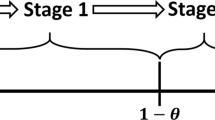Abstract
This paper considers trade policies in a small open economy in which two influential interest groups lobby the government. Since competitive lobbying leads to excessive rent-seeking expenditures, the lobbies have an incentive to cooperate. The outcome of cooperative lobbying is characterized in terms of lobbying and bargaining power of the two groups. Two important results are derived. First, if the power of competing interest groups is balanced, then cooperation leads to free trade. Second, if it is unbalanced, cooperation may, on the contrary, increase protection.
Similar content being viewed by others
Author information
Authors and Affiliations
Rights and permissions
About this article
Cite this article
Aidt, T.S. Cooperative lobbying and endogenous trade policy. Public Choice 93, 455–475 (1997). https://doi.org/10.1023/A:1004983430940
Issue Date:
DOI: https://doi.org/10.1023/A:1004983430940



